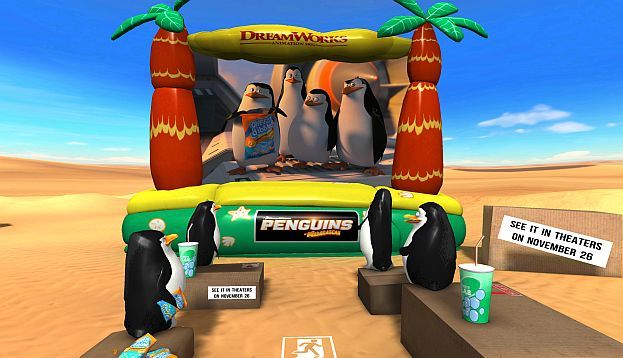VR seems like the new buzzword in Hollywood, replacing some of the excitement lost as 3D turned out to be much less important than many originally hoped. Filmmakers are beginning to experiment with the possibilities inherent in immersing people entirely in a world, but the technical issues are vast.
More than technology, though, filmmakers must wrestle with the basic concepts of story and character and plot, and how those should change when put into the context of a complete virtual environment. Should the person experiencing VR have any interaction with the environment beyond selecting where to look How does VR change the emotions experienced by the viewer The entire vocabulary of filmmaking, so painstakingly established over more than a century, will need to be re-examined. Big companies are already beginning this process.
Samsung is the latest huge company to commit to virtual reality. Oculus VR has spent the past 12 months working with Samsung on the just-announced Gear VR. But Hollywood studios like DreamWorks Animation has also been experimenting with the Oculus Rift DK2 technology. In Berlin last week Samsung, Oculus and DreamWorks unveiled new mobile VR experiences that will be available this fall.
 Shiraz Akmal
Shiraz Akmal
Shiraz Akmal was in Berlin to showcase what DreamWorks Animation Studios’ new DreamLab has been up to. Akmal spent 25 years developing games, including nine years at publisher THQ as vice president of operations in product development. He was also a founding member of Heavy Iron Studios, which THQ acquired in 1999. These days, Akmal is the head of business and product development for DreamLab, the new division at DreamWorks Animation that creates mobile, immersive and interactive experiences. He talks about the opportunities mobile VR opens up for Hollywood and game creators in this exclusive interview.
What excites you about the potential of the mobile Oculus applications for Hollywood?
As part of DreamLab at DreamWorks, we create mobile, immersive and interactive experiences combining cutting edge technologies with DreamWorks storytelling expertise to create new and exciting ways to entertain our fans. VR is a unique medium that allows our audience to interact and laugh with DreamWorks characters and content in a whole new way.
What are your thoughts on the virtual movie theater?
We’ve taken a unique and creative approach to the idea of a virtual movie theater. In DreamWorks VR, we feature a unique Penguins of Madagascar Movie Trailer where people are able to watch the trailer on the actual Penguins set and interact with the cast of Penguins in a fully immersive VR environment.
What opportunities do you see with DreamWorks properties with Oculus given the recent How to Train Your Dragon demo you developed?
We continue to build on our extensive experience creating and operating location based VR experiences. As part of our How to Train Your Dragon 2 promotional campaign, thousands of people have flown Toothless through the world of Berk as part of our Dragon Flight VR Experience.

As a former game developer, what do you see mobile Oculus opening up for video games?
Like any new entertainment platform, a whole new set of games will be launched for VR. Based on 25 years game development experience, I believe the most successful games will be those that are designed for VR platform rather than just ported to the platform.
How easy is it to develop for the Oculus system?
The real challenge lies in understanding what type of experiences work well in VR. Working in VR is completely different than any other interactive medium before it — with many new considerations that traditional game development has not faced. We’ve spent almost two years learning what works well and what things to avoid — our goal is to make sure that everyone has a really great and memorable first-time VR experience.
What impact do you feel Samsung’s mainstream reach will have on getting VR out to the masses?
Samsung is launching the first modern day consumer friendly VR device. Most consumers outside of the game and film industry don’t really know anything about VR — so we’re happy to see Samsung taking the first major step in introducing people to what VR is in a very consumer friendly manner .
Hollywood embraced Oculus at Comic Con, how are you seeing studios utilize VR for promotion and fan interactions?
DreamWorks has explored and developed for VR for a couple years now. As the novelty of VR wears off, users will seek out more immersive and unique experiences — such as our Dragon Flight VR Experience or DreamWorks VR experience that recently was announced for Gear VR.
What opportunities do you see with Oculus for theme parks and attractions?
We’re optimistic about location-based VR entertainment, considering we have researched and developed extensively for the space. While VR hardware is good enough for personal use, it’s not quite ready anytime soon to survive the tough demands needed to operate in theme parks.

